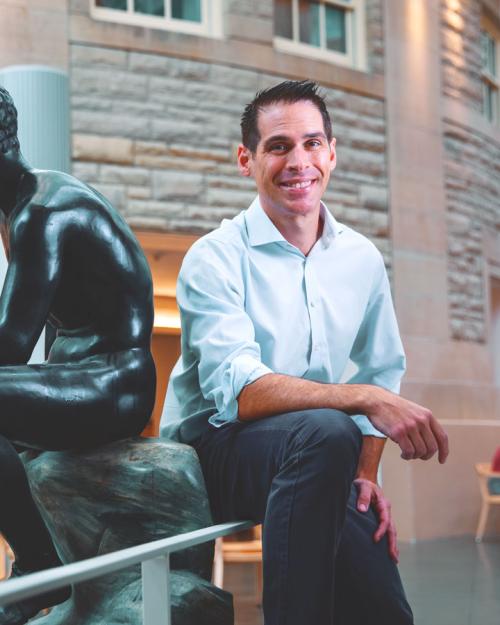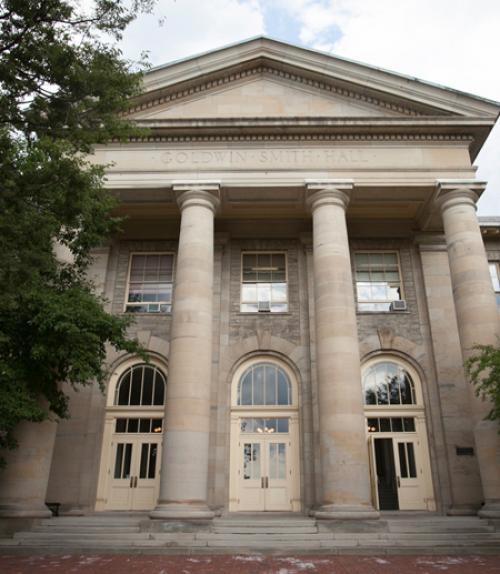A first-generation science and engineering student while at Cornell, the late Stanford H. Taylor ’50, Chem.Eng. ’51, considered the humanities essential to a well-rounded education.
Taylor, who died in 2010, and his wife, Jo Ann, supported humanities initiatives at Cornell including endowing the department chair of the Sage School of Philosophy in 2007. The Taylor family is continuing their legacy, following Jo Ann Taylor’s death in 2013.
A recent $5.2 million gift from the family will support postdoctoral fellowships in the humanities and qualitative social sciences at Cornell, and will establish a permanent endowment for the Society for the Humanities.
“The humanities is the foundation for education in all fields, providing students with the deep reasoning skills and spark of creativity that will make them more fulfilled people,” said President Elizabeth Garrett. “I thank the Taylor family for their generous support of scholarship and teaching in the humanities and social sciences at Cornell, and I look forward to the Taylor fellows joining our vibrant community of faculty and students.”
The fellowship program was announced by Gretchen Ritter ’83, the Harold Tanner Dean of the College of Arts and Sciences. She said that Taylor “believed passionately in the importance of the critical, creative and integrative role of the humanities and social sciences to further our understanding of the human condition and to help us live meaningful lives.”
Beginning his professional career at International Minerals and Chemicals in the 1950s, Stanford Taylor advanced to executive positions with Allen Hamilton, Abbott Laboratories and other companies before retiring as an executive vice president at AeroVironment Inc., where he ran its wind turbine and windmill technology division.
“My father was particularly motivated and very taken by philosophy,” said John Taylor ’78, “and he was concerned about the lack of depth of education that people get without any humanities background. The ability to write well and think clearly on a broad level was extremely important to him. He was a lover of knowledge.”
The Stanford H. Taylor Postdoctoral Fellowships will provide opportunities at Cornell for outstanding recent Ph.D. recipients to develop as scholars and teachers, and to enrich the academic life of the university. Two fellowships will be awarded in the first year for terms beginning August 2016, and one in each subsequent year.
Scholars in the humanities and qualitative social sciences (such as anthropology and sociology) who are within two years of completing doctoral requirements are eligible to apply, and they must have received their Ph.D. by the fellowship start date.
Fellows will teach three courses, one per semester, during their two-year appointment, with a fourth semester free of teaching obligations. They are expected to be in residence for the term of the appointment and to take an active role in the intellectual life of their home department, the College of Arts and Sciences and the university.
The Taylor family gift also includes $2 million to endow the directorship of the Society for the Humanities. The endowment realizes part of a $1.33 million challenge grant from The Andrew W. Mellon Foundation in September 2012 that funded Society for the Humanities initiatives in the short term and offered $1 million in matching funds if Cornell raised $2 million to support a permanent endowment for humanities programs.
The endowment will support initiatives of the director, graduate student fellowships, collaborative faculty writing groups and targeted research initiatives.
“The Society for the Humanities is deeply grateful to The Andrew W. Mellon Foundation and the Taylor family for their collaborative support establishing a fund for the society’s future endeavors,” said Director Timothy Murray, who will be the first Taylor Family Director of the Society for the Humanities. “In particular, this will enable us to maintain our successful residential fellowship program for graduate students in the humanities. The fund also will permit society directors to continue to maintain an international and national presence in emergent humanities initiatives.”




